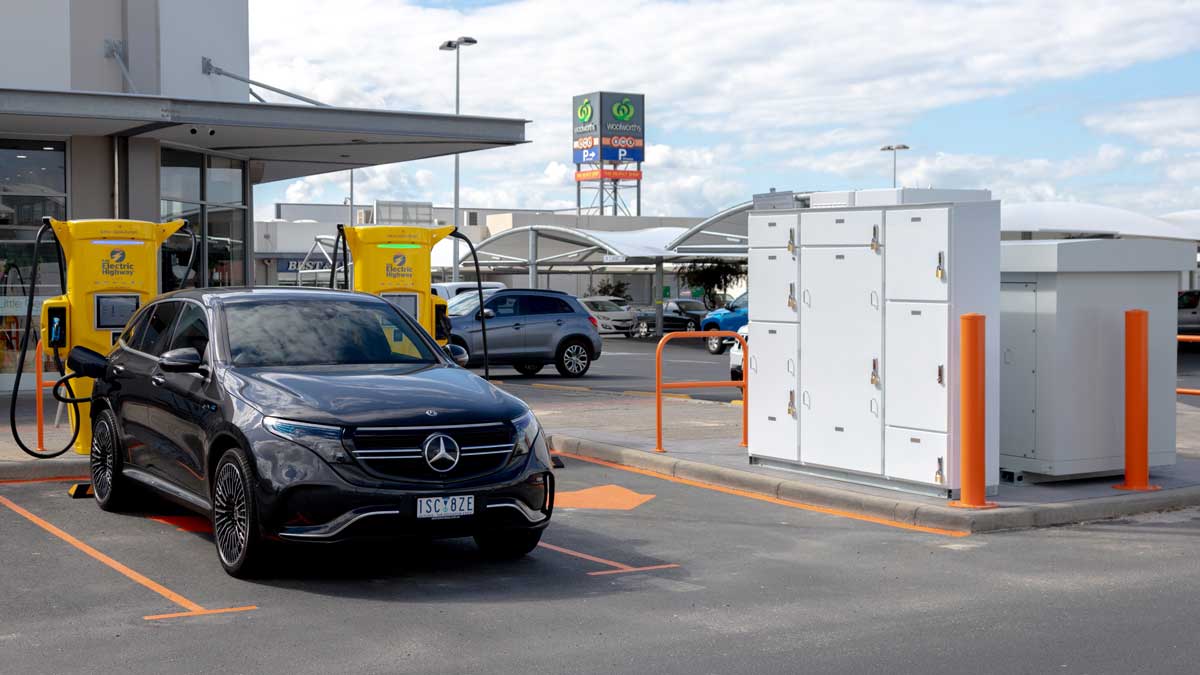A dynamic pricing model for electric vehicle charging could make regional travel cheaper than powering up in the city, according to a plan unveiled by a new player on the EV market, Bell Resources.
The start-up, chaired by ex-NSW Liberal leader Kerry Anne Chikarovski and headed by CEO Mark Avery, has bought a string of car washes with the intention of adding ultra-fast EV chargers, solar panels and energy storage batteries to the sites in a bid to create a highly visible charging network under the name “Bell Hub”.
The plan is to capitalise on prime locations where car washes are typically located, and Bell Hub would install pricing signs to entice consumers in for a car wash, vacuum, and a battery top up.
Just as there are different prices with unleaded and hi-octane fuels, there would be lower pricing for slower 175kW chargers (branded Bell Recharge) and higher pricing for ultra-fast 350kW chargers (dubbed Bell Supercharge – although we wonder if Tesla might take issue with that).
And in a departure from the current pricing standard of flat-rate charging – often used as a selling point for EVs enabling drivers to escape fluctuating fuel prices – Bell Hub wants to introduce dynamic pricing, which will change with the location, state of charge of batteries, and other factors.
How charging networks do things will likely be shaken up as Australia’s EV market continues to take off as revealed by a report from the Electric Vehicle Council today.
Some carmakers have cut deals with Chargefox for up to five years complimentary charging for the new EV owners, and the St Baker-backed Evie Networks, which has just announced a plan for 300 new chargers, changed its pricing structure in December ditching time-based charging but lifting its per kilowatt-hour charging rate.

Avery thinks the competitive edge will ensure a steady stream of new EV owners as customers.
“I think consumers are driven by price, it doesn’t matter what product you’re doing, the best price you can offer is an advantage to the consumer.”
Bell’s pricing policy could also upturn the current fuel pricing trends where it is more expensive to fuel in regional and remote areas.
Speaking with The Driven, Avery says that Bell Hub would base its dynamic pricing on a number of factors.
“Dynamic pricing is the capacity of what’s in the battery on the site, it depends on location, time of year and usage,” he says.
“Really at the end of the day it’s a basic economic thing – if we have a large supply of unutilised battery capacity, we’ll drop the price.”
While the company plans to install solar panels on the awnings of its car washes, and even lease the roof space of nearby buildings in order to supply renewable energy to its charging and battery installations, it has other plans for sites with cheap real estate nearby in the regions.
“Regional charging could be cheaper,” says Avery. “In the country there’s an opportunity to build out solar capacity, especially with a solar farm in close proximity to the site.”
“In some regions there might be an opportunity to set up a microgrid within a network, particularly regional areas where there is a transfer of power,” he says. “It hasn’t been commercially done, but it is possible when you’re working within a grid area controlled by one instrumentality tower, for example in western NSW.”

Avery is especially excited about the prospect of electric utes coming to the fore.
“We’re at an exciting time, there’s a lot of new models to suit different markets tastes coming into the offer,” he says.
“Electric utes and SUVs and sportscars you name it, they’re all coming. Existing incumbent players like Ford and GM, and new players like Rivian – the Rivian is going to be one of the big stars coming into the Australia market.
“It will be a massive deal with the tradies,” he says.
But he doesn’t think the proprietary “Adventure” network planned by Rivian will take hold. “I think these guys are a bit like Tesla, they’ve had to think about that, but these are early movements that will fall by the wayside.
“If we were further down the path, fast forward a few years, they wouldn’t do it,” he says.
Within the next five years, Bell Hub has plans to expand to 300 sites around Australia, and wants to employ staff to ensure new EV owners understand how the charging process works. The company has also cut a deal with Merlo Coffee for an on-site caffeine fix.
Installations of the new charging network will commence from 2022, starting in Canberra and South East Queensland.

Bridie Schmidt is associate editor for The Driven, sister site of Renew Economy. She has been writing about electric vehicles since 2018, and has a keen interest in the role that zero-emissions transport has to play in sustainability. She has participated in podcasts such as Download This Show with Marc Fennell and Shirtloads of Science with Karl Kruszelnicki and is co-organiser of the Northern Rivers Electric Vehicle Forum. Bridie also owns a Tesla Model Y and has it available for hire on evee.com.au.

